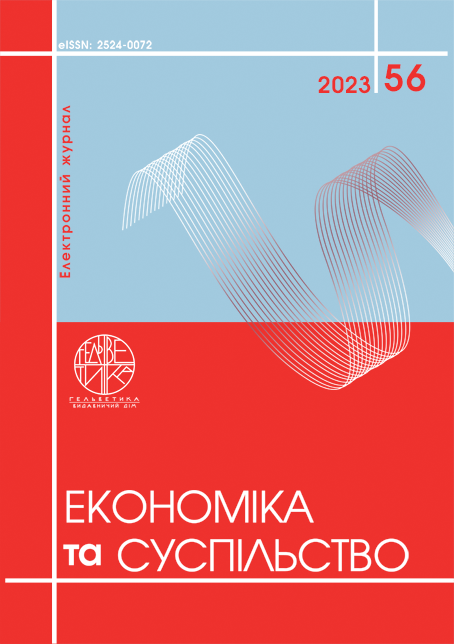РЕЙТИНГУВАННЯ УНІВЕРСИТЕТІВ: ОЦІНКА ТА НАСЛІДКИ
Анотація
Метою дослідження є критичний аналіз сучасних методик рейтингування університетів та систематизація критеріїв оцінювання з врахуванням інтересів стейкхолдерів освітнього процесу. Попри критику у наукових колах, рейтингові оцінки за методикою Times Higher Education, World University Rankings Quacquarelli Symonds та Shanghai Ranking Consultance залишаються найпопулярнішими серед світових рейтингів університетів. Метою рейтингування є створення бази для порівняння та спрощення прийняття рішень у освітній сфері. Однак, складається враження, що цільова група популярних рейтингів навмисне залишається невизначеною, щоб створити видимість універсальності рейтингової оцінки. Спільними для методик критеріями рейтингування слугують якість освіти та викладання, бібліометричні показники та репутаційні характеристики. Однак, ці критерії не однаковою мірою є цікавими абітурієнтам та викладачам, роботодавцям та провайдерам освітніх послуг. Окрім цього, в межах однієї і тієї ж цільової групи, наприклад освітніх закладів, є особливі вхідні параметри (галузь знань, величина університету, доступ до фінансування, доступність освіти тощо), які підвищують пріоритетність одних та нівелюють важливість інших критеріїв рейтингування.
Посилання
Hamann Ju., Ringel L. The discursive resilience of university rankings. Retrieved from: https://doi.org/10.1007/s10734-022-00990-x
Academic Ranking of World Universities (ARWU). Retrieved from: https://www.shanghairanking.com/news/arwu.
Times Higher Education World University Rankings. Retrieved from: https://www.timeshighereducation.com/world-university-rankings.
QS World University Rankings. Retrieved from: https://www.topuniversities.com/qs-world-university-rankings.
U.S.News Best Global Universities Ranking. Retrieved from: https://www.usnews.com/education/best-global-universities/rankings.
Szluka P.Relationship between bibliometric indicators and university ranking positions. Retrieved from: https://www.nature.com/articles/s41598-023-35306-1.
Кривцун І.М. Сучасні підходи до оцінювання конкурентоспроможності у вищій освіті. Retrieved from: DOI: https://doi.org/10.32782/2524-0072/2023-50-72.
Brankovic J., Hamann J., Ringel L. The institutionalization of rankings in higher education: continuities, interdependencies, engagement. Retrieved from: https://doi.org/10.1007/s10734-023-01018-8.
Gerdin J., Englund H. Contesting commensuration public response tactics to performance evaluation of academia. Retrieved from: www.emeraldinsight.com/0951-3574.htm.
Lim М. The building of weak expertise: the work of global university rankers. Retrieved from: DOI 10.1007/s10734-017-0147-8.
Shahjahan, R. A., Grimm, A., & Allen, R. M. (2021). The “LOOMING DISASTER” for higher education: How commercial rankers use social media to amplify and foster affect. Higher Education. Retrieved from: https://doi.org/10.1007/s10734-021-00762-z.
Nomanesi Madikizela-Madiya. What Is the Mission of This University? Te Question of Isomorphism and Quality Practices in the Era of Institutional Rankings. Retrieved from: doi:10.1108/S2055-364120220000043009
Elken M., Hovdhaugen E., Stensaker B. Global rankings in the Nordic region: challenging the identify of research-intensive universities? Retrieved from: DOI 10.1007/s10734-015-9975-6
Lebherz Carmen, Mohr, Cordula, und an. (2005). Wie brauchbar sind Hochschul-Rankings? Eine empirische Analyse Teichler, Ulrich [Hrsg.]; Tippelt, Rudolf [Hrsg.]: Hochschullandschaft im Wandel. Weinheim u.a. : Beltz 2005, S. 188-208. - (Zeitschrift für Pädagogik, Beiheft; 50) .
Marcelo M., Justin J. W. Powell (2019) Ratings, rankings, research evaluation: how do Schools of Education behave strategically within stratified UK higher education? Retrieved from: https://doi.org/10.1007/s10734-019-00440-1.
Опитування студентів економічних спеціальностей НУЛП «Якісна Освіта - Успішне Майбутнє», 2021. URL: https://docs.google.com/forms/d/1yzJLDksYMAvWCmFNhcUb5rt-Hfw62cVlJsYXJx4qJTo/edit.
Hamann Ju., Ringel L. (2023) The discursive resilience of university rankings. https://doi.org/10.1007/s10734-022-00990-x.
Academic Ranking of World Universities (ARWU). Retrieved from: https://www.shanghairanking.com/news/arwu.
Times Higher Education World University Rankings (THE). Retrieved from: https://www.timeshighereducation.com/world-university-rankings.
QS World University Rankings (QS). Retrieved from: https://www.topuniversities.com/qs-world-university-rankings.
U.S.News Best Global Universities Ranking. Retrieved from:https: https://www.usnews.com/education/best-global-universities/rankings.
Szluka P. (2023) Relationship between bibliometric indicators and university ranking positions. https://www.nature.com/articles/s41598-023-35306-1.
Kryvtsun I. (2023). Suchasni pidkhody do otsiniuvannia konkurentospromozhnosti u vyshchii osviti. [Modern approaches to competitiveness assessment in higher education]. DOI: https://doi.org/10.32782/2524-0072/2023-50-72.(in Ukrainian).
Brankovic J., Hamann J., Ringel L. (2023). The institutionalization of rankings in higher education: continuities, interdependencies, engagement. https://doi.org/10.1007/s10734-023-01018-8.
Gerdin J., Englund H.(2019). Contesting commensuration public response tactics to performance evaluation of academia. https://www.emerald.com/insight/content/doi/10.1108/AAAJ-09-2016-2717/full/html.
Lim М. (2018)/ The building of weak expertise: the work of global university rankers. DOI 10.1007/s10734-017-0147-8.
Shahjahan, R. A., Grimm, A., & Allen, R. M. (2021). The “LOOMING DISASTER” for higher education: How commercial rankers use social media to amplify and foster affect. Higher Education. https://doi.org/10.1007/s10734-021-00762-z.
Nomanesi M.-M. (2022). What Is the Mission of This University? Te Question of Isomorphism and Quality Practices in the Era of Institutional Rankings. DOI:10.1108/S2055-364120220000043009/
Elken M., Hovdhaugen E., Stensaker B. (2016). Global rankings in the Nordic region: challenging the identify of research-intensive universities? DOI 10.1007/s10734-015-9975-6.
Lebherz Carmen, Mohr, Cordula, und an. (2005). Wie brauchbar sind Hochschul-Rankings? Eine empirische Analyse Teichler, Ulrich [Hrsg.]; Tippelt, Rudolf [Hrsg.]: Hochschullandschaft im Wandel. Weinheim u.a. : Beltz 2005, S. 188-208. - (Zeitschrift für Pädagogik, Beiheft; 50) .
Marcelo M., Justin J. W. Powell (2019). Ratings, rankings, research evaluation: how do Schools of Education behave strategically within stratified UK higher education? https://doi.org/10.1007/s10734-019-00440-1.
(2021) Opytuvannia studentiv ekonomichnykh spetsialnostei NULP «Iakisna Osvita - Uspishne Maibutnie» [Survey of economics students National University Lviv Polytechnic "Quality Education - Successful Future"]. https://docs.google.com/forms/d/1yzJLDksYMAvWCmFNhcUb5rt-Hfw62cVlJsYXJx4qJTo/edit. (in Ukrainian).

Ця робота ліцензується відповідно до Creative Commons Attribution 4.0 International License.


